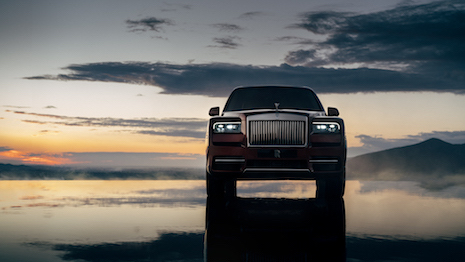Consumer perceptions of French jeweler Cartier as the most timeless, high status and exclusive brand helped the house earn the top spot in an index of the most luxurious brands.
Research conducted by Kadence found that factors such as heritage and quality resonate the most with consumers as they are determining the luxury positioning of a brand. While there were a number of global trends, individual markets valued some characteristics and brands more than others.
"For many Cartier remains an aspirational brand, still slightly out of reach, and our study showed that aspiration forms a key dimension of luxury," said Greg Clayton, managing director for Kadence International, London.
"Equally, Cartier has glamorous, even romantic associations," he said. "Lastly, the French provenance of Cartier reinforces the romantic brand image."
Kadence’s “Luxury Index 2018” is based on almost 6,000 consumer interviews across 13 countries. The survey polled consumers on characteristics such as quality, distinctiveness, status, exclusivity, history, timelessness, feel-good factor and experiential.
Quality comes first
Cartier was the top brand globally in Kadence’s index. While the jeweler also earned the top spot in the West, German automaker Mercedes-Benz led the rankings in Asia.
Around the world, cars are the category most likely to be seen as luxury, followed by jewelry, watches and airlines. Accordingly, the global top 10 is dominated by automakers, with Rolls-Royce, Ferrari, Lamborghini, BMW and Porsche making the list.

Rolls-Royces unveils the Cullinan; Image credit: Rolls-Royce
Kadence points out that these manufacturers are well-known and widely coveted, helping to propel their luxury status.
On the opposite side of the spectrum, some categories, including watches, gain prestige from being exclusive. For instance, Graff Diamonds scored high on the luxury index, but is not a household name.
While the idea of luxury was traditionally tied to rarity and high price points, Kadence’s report found that exclusivity was the least important of the eight traits it measured.
Another trend in the index was the impact of brand history on positioning. In general, those with a longer heritage scored better.
While Cartier had a fairly even perception around the globe, a number of luxury brands performed better in their home market than abroad. This was true for Tiffany & Co., which came in sixth globally but placed first among a U.S. audience.

Tiffany celebrates a first with multichannel campaign and Elle Phanning debut. Image credit: Tiffany
Much of the focus in marketing today centers on creating experiences, but the index found that “experiential” was the second least important trait to determining a brand’s luxury status. However, this trait is more important to millennials than it is to those over the age of 35.
Positioning practices
There is an ongoing push and pull in the luxury business today between the heritage brands with decades or even centuries of history and tradition behind them and the newer, younger brands that still have something to prove.
But each type of brand has the potential to be what Luca Cordero di Montezemolo, president of NTV and former chairman of Fiat and Ferrari, calls evergreen brands. At the Financial Times Business of Luxury Summit, Mr. Cordero di Montezemolo spoke about how brands can grow into an evergreen house, which will allow them to live a healthy life long into the future (see story).
When a company wants to establish itself as a luxury brand, sometimes everything but the product needs to be changed, according to a Glenfiddich executive at Luxury Interactive Europe 2015.
Glenfiddich is a single malt Scotch distiller owned by William Grant & Sons, which dates back to 1887, but only recently has the brand moved to position itself as luxury. Working from the quality and heritage already present, Glenfiddich is altering packaging and positioning to make itself stand out from competitors (see story).
"The results point to a valid formula for luxury being the maintenance of exceptional quality standards over time," Mr. Clayton said. "In prosaic terms, this might equate to reliability, but luxury depends on establishing desirability through premiums in design, performance, scarcity, positioning or experience - the aspirational je ne sais quoi.
"There can then be localized effects – we saw that national pride appears to have played a role in Tiffany’s high placing within the U.S. market and Singapore Airlines being at the top of the list in Singapore," he said. "Heritage and provenance certainly play a role – and we believe that it will be many years before we see a globally recognized luxury brand emerge from a developing market."
{"ct":"jVyJmCBs\/27Tk9zPFA\/pzMjqsXGbVxUL9XHUgBbYtDwXNJLraOzBvzJMqnWr4XxNbekjWXAdIFFJFVuViD1ZPKNrJQ8p9yyJQqJa6rFfay2ZuYyNKt3W4xAJcvNQ248Wn1jVZD\/vv8L9MRyLijGeS\/d6eUHLLsBIIMaXoJriuNV3sk9yyCU2l5e6PCpz7FA6wDBAl2HurLOLgdk9jaKZBA0S5A9xhK3XC\/nbKzB8BbxIjAFD5f3StEjxnOsWAYYhtiA8S+WeBbNIJE4QeucnQ4gSNyx9hf0\/hhpBgNNzU3f9jla0SJdDjGcI3tjYtVe23vzNRPA5SIuaEXBV2FvCjMOmTwbl9JXYWM9NgOVg87dAIIKGhPFFKnrD1lcsIXmUFgShpG1Ue9zI\/ElLxReCdlkYi7bHxuCR40tLN+QQn3BvB41w00fcySCaFIg5WVz47S9iAsWymIG+s0hdp5evryhN9+XgEn3JIGEm5iz+JGI3iMY83CgRRS9uUnTqyaaC9Ce9W2dQtDyw94HvM6m4A+UTK3IGYz6iMGLEa+8UhsBe+vbJN6YBGwAFPmJKSrpBePuFIUN0U8UYawHuzFQynu+e3U2x4YW7M\/B5alGQp1EE4IefNrDZNXtfRQvO15660G91vKVUSaAfCWZpXYsgUgJlU+sxZiKiv2frmN3nYHEm3wPN2xNHRiwIrT3cKK622JD70qbyX1FsIqj+yc0gM1gssjda3xcQeW80kIIuLUir7ow29ra9CpXr6Nl6rb9o8pCvhZskBJcVl82nE1bY9ejjCqZCmttDjK8g8dg24HhzcoCzFUkM9wg1hqdx81jc\/K7xjF6bpu9U9gZIbGw6n79x5FO11LNupUNX3U2DrSeHiBIIG84UgADAaZ+W+iUF3W1mDM3tb9e+YAw11u4nLbpU8tt0IUr19Tnl9gcHcENxnQ0PX9QYF8hitKZcmK1pS90kBnW56O5BFpbe1eLsB+yofWbE46TEDZ3ApyNNabgS5f+6SDwKtKR91X3dvrR2Gg0UodkT4673HTnTB+lw6JnqcYdTYL3nJ+CuXDvWJ1D+uYsFLJ8V92Flk8VknP0FfsuyUcD6avXK9gmTSfxgQodze4GXeIvz93gBN5WXMW1wDm3SgjOgaPZoycld0XOIU3oBtEOoD1uz7NJIIN4bNpf7AJYdQefM541dyrRCbx121DVf5OWSaMxHCL879QbWLzSPpWaK4rFor3bms6FhOYmjopBSC5zZUPyMBR5VacUdLQrthJPM8xpB6UvBhFOT87Xpc5rUe6H6wMf9xawsM+xNOFIGuCNLNfgllxQZrVKD7Myb1CzEsS6Oq8VLITLm18p6FfWDem0CdtVJVYJgHJWrcGt2kQOCorMNO+MGu0eRROQVDRqmBekidcJEFuRmWvl3Sm0V4N1GMp2ItUBhx8cQ7eaU02L310RWByOqxUcD5m80FrwBdKkXD2Kz2I51HaOnu6cI2Bn9FoQGI1nvdEOJyJmhG3gYcYIJE1UB7cNsOXM8PA6eHyYw3qwoFUWV2DBPukb3SZdWIUsFAjOunxnXknMW2tMo4ZQakde7JnUP8RvQZUPhEqLD062OsWbGdgQ\/HPfwm1Ldc6vA5aoE7GgKouwVEg3ZFUmcOY\/nN0O7g47w83wXCkGyJzoPNX+ZlA0rXPyyfUHFHXTfBdYtIl+uH1NOoBv0z14ALiga9ZlGGG0ZhU9ahSCXG3+gCrwkCaLqjKC74WZnf3brzpTd25CTySD+7jGiUXy5vfR3bKJWvnTP34yq2leDCFIbaQLW2IwpXb54j7kbrzdqLFT0T9PVlVTZtXtPHtdnkKEK+sl0nxHbqGSZTdba8x4VygeIZBdQj2x9iBuSXb6+Uo36UkRlJne4rGwOQOkTWFjwiwSb5Dy2xSTI4GxeNAuwHJsQmMH8VLhUHRcNOi\/W6FN7nCieD\/pMtdQJxsjgO9CqHOsfAd5fnccCgF1MqzDSwxQbKc1TwlPByFhsfUKGNrCCiYUBteVLoqoaBsW0i+4y6nYSTQvpJw7j3aJtF86+V4jQgn+T85D93Ac9N5EJbL+oKI2pc66JdBuuIxGf6MTQX9U4PK2w2oCBAunhlIT7U4Rk7wNRFLO5FQltGp6KDN\/2oUOP2M\/hT7LhQJJwQ1GJGUQFqcRdY\/0BwRpeGTpe29Lfq58J1BvDXzTVt+xnu6juh71MJLPDKiTaQIED\/n2qdpDA+xEI5F8JniCtn9XOyvEIVj\/fy\/xTdSfgYQ1yiasfQpc\/xcgIHCRyoA9sWD1JELhkN8we+lPA+21WrtqccuYeEnu13C19F7BzRw1LHzc0kLlFkJXVkkMJfd3pxYF3\/E9BdmbO+q2q5J207ytW\/1L4vY6iBh1mAPIJaYJIqx98x4KSzRx1uCniFgDzSmSJ4tqN\/sjIU0Z1c9MUAObS46fgRFs6WUhHcawnMXNUv1KUL87mMUImGjddZNfvvx\/u3Hj+3iNJ6wIRu\/bDvr5plKwbCePjURokRGOnOfmdJTLNipuABhTrDC4u3MqtNRxaGtzIZbdtYTG9hVfUQCWPuokn3FTmQPXmn99qcjnRyMxyaWnMG7DqpMBaAS8SM6IRgOc9C9OT0i0DjHCJWoPW4YOGkjFm9r1\/HRwiU80dgEVtzwBYXLCuooYthQpsN\/wnjxjukEXckEn3KKvMayPAO7fuKYZmoTRdpy1kenyAX4NFPa6+GQpGq4Y7LQ8v5HRGpOm+6YNvRWNDEmQ+sV7f6LjgxeJmEruSqshFSqsCEcwH6FJS7BAVbrWZk8QqbgCOn7RAOvyBwID3cvvwibRiTmb5GYla472ueXoBu4jLWBjTdRP80FL85cmPIwMsuwSrBYtgMFSZCnGA+frMAG3FyA8mkp+lH4O1z\/W5+tUOCb9aQ8oc9nZqU08DLG7JV2kd4kX6\/cmkBoIiok1+G36YtkkiHuyqh1smVY8JgRtH9lPKnPkQ25B36j40p\/Zqp9f6GBkNBeyKxQTf5CnYSeOiDnoPCLelYDEBhkAbQdwdP0jERJBJe2kbK7FJ3xT98F2uYa9a3W3Hk4MC9L8zHJQLyUX6uPYPMDPs4vbdkzQiEUB\/B+yVOhjLktamNNL6KCHq4QyFl9yeZhGbuzI\/ppufZbjCe548KScDrxejP7tQ4d1pVc7iUlHfc0fqV\/DpKkiWAhhb88xXi7vORhHpgEkPaSoHW0lJSUHzuam63ZrnzoWJkqcqnoj+Q\/hShFi9TXzcKbmItehgLHlvtAX60HGkGCo6Mn8tKT2oj1i52+uBhVY\/Un7ZLgJRH7fqLF\/cg7nDvtxvo1IhS7LSjPWFrpXhzPzJqMdVk6kQfJVtRtTd\/x8dMDmbDH0t9eBgj5Xgcs6eN+TdCQ6XWh2r06sLfRnB3Uy8QvArLkPvkD6TlM50dZVx+hCRpCZZCchg96VQ+UhB76b4IPfqnZDPVwH9Fnv6AnD1sjtrgb2atnLoiQchGpwwE47Ixw\/iIwCjGz0w2FSR649tSABTLWE6Q5Vy48M\/GfLckzl4ucDMTZvZKOiUTV0V8WVJwo11GycXcJuVHpqk7rbwFSN+MjqAx+jTOV5H2Y+hdcNRRI8l+Vv8Ys75CEibz5UUGjETtdgczl\/omeAZyj\/09SB5A25RoMJWMeXAk4MOPCARpHmBIkufaLdS2CsN+0HHNnsOGIHaeEJiMYA+SdnITSYsOS0zaypQawras9awI2zVjYsvMYv5DsiLIKFKOb7mZ98ESIbqBGEvxVcOzQFEVDqyfGBZ9IFZWM7LvxVXakH9Bb4owEsbLt4qWG\/hQl6hn04tM7VkEOB+XhuKVQGQM0WDV9Jq\/DhYMbQdojvJZDgaGO0hg4mQNSEwn3kbYcLrkxQTdsj55+tA6yYh7QMdd9NZImu4kHZOOOLVm9Gxz4CFdCYDAbCfnceQPu2yHf4xWZP\/nIfHwSQyA3C5nUwCJpLSzhUoDucxgoQjffBjizAaheYlvxtJvvnpky9GUdjRO69Y1DmdhuuW2Eg04mekcOMlqz3jLkhKXTsVsaKmzxkoPNvpkQByuOuP+wbg7YuZqCEaZ1BGnbuec0gZdAViKlK0ySdZYMIdlBmAoKfDyidDLxRAWFtMos3Eno3c2UD51+2ai3gnRKeQpecPAX1HZL4VIZQMiYszkbDKxcwHj5d7M0Vq3SonH5mIUwEEvHc+YF\/8vafVigKENzh9iruvfOfaeKT5UlUhnGAGndcMljXf1fQ71HMGfdnq4wzr50hqu7VxbkPk9UasTAL+DoFmVxY18iNeu81CEa56FpCYWvRwEuFmrdOULCkUVdMiySrnqg7z9yerI8sMsgIWbQLqtwoxz55tH5JwyjZEJGmIz7RD2oj9Vtyrf\/7x9CCKCysO\/Seq6qGkSc65qq7HCE85UUWfxMpuPHATt47OTqEehQhmDuZbDlGRPT0p9c4J\/LK9E0HHN7+ffqC+HuPoV5QOJHxRtAdpzYZW9IC1jMvxqkQWJNQNFPBmZHXIlpxyIUT5BB2Lg9FEcMlS1wlNy8ZqxBTJSBIBZ9XR0YYH9Eih0xuJodqlZDtJCr4Liur1jxMvVakWso0ux7+5UIDO1cGgWPEapxFKRkGUaQiyT6ZK5WRnu105vIhTZf0D25H49vMtzz7OZRjR1MINTa0eixCtFVIDGKne1N+tenOVAxy9YX4Dau5sjLx4xYot0l70rP3gpOB4E7CVwPPNnF3gj26I+Pwwr7wK8DQj1fhInu0tBOpiKBhUS+fKZHCcVrWn1nR9nKQ5LaE\/AzAzg7ldUt5kL32vSTKyjmDIMLkE\/IPRRem3EvSf5ekUt8Ad87XD3S\/p8BUXMGNCtH3nhtrabbRwBJ80O7NKqVA8zsRowQuYBu1n1IgTlKpqa6+l0hSUynHErroHI5zssE4P8ojWoB+Q\/A9R1oFDqZSjBWYgHRTkBzpBlHpTDSuV\/KXT8IR+CYlk\/jeInj8REWmyugd572mgJQ6+px2toMMikBO3yoaQSvSBK02Yjg35fj5kWOB\/SNI6HdmUeckYX9CmiuzmJ8oPTd76OQXBXkD\/TOARXxgXT3OFYeHkLRZTghuO+74vBYIiFhUxp24DyVfjcw1eibqAS\/3DuDvXQqrLEVyIUO0eOBHuOAwOOZ3lGhudCvY0xggL0hhZiqKFpseqP1KSkR\/VrUJW6N\/jRLnR+hdarXCwvTaqW9iU5J5kuM\/ekAXTtN\/UBe4tF2tDFib8AZvZnguQ+NmL9E14Y0wRd59Q5BsCfKw\/rvHOETGaX\/s+kOPtcTLIUDGNJaB0WUD7fFIX47aKxTT922XfcJxgHElfb4oq\/ieurFKEylm4ivBKyVvXrGc3BxCehLztK67BkKpH9pFzWrHhEIu7xgmowGv79JdfcfmPfHG+6HODkEyoTqQJn0F\/t1GLjUhUo8UsTgaSK9FLVPTXXeYLYlH1Oe66Kr23nrbbLSttXxH2vn4O4gray4LVzqDhdtnC1TBBHyjpP+5oN4KtZz+keokhLG2SDmaMCvzPHZ0FsToZmhbYSpDndtU1u4r9XDynH73qgX480wzwxXCfe2eXHILSisyMBlXZWjoSYIxuNhq1c+oxih6eRMCKrOH474YVqtpugYOfGhbIzqQz1Rbbq8tBxO23ZMZzSAA9\/Ts66H3JAMa0iVDmtvS9PmxZHjKtibv8e0hWNIe88IhrD+Cb76K3hLFuUK3YPoQ+JKWt8kf3HBloaF2eAfbx\/t9AbfXbVvV\/otkvpBixnuattHsfAiEf\/IkMXME6oE07XBQaHJ7zLx3GCZvgA12KFPbT2xfSu3p6GGB6+5orj3a+HwFArC7kasUL1LGe+xE3WmVwcj17Meh356PeKWEP0+cTS5RakCYwpSn8G40U\/\/hvVoRrmCyhoP8+0mALVfnTSOjI5AQSA3IsVrTaAc4QQhdRpyZ0Q+CBDosjBOr77ukW19++sXxFYyBH\/o9e19HlJXdP9ZZJh5DQ+Qj4TALA7X339AlIvtFUiWnUZlgPIXg5\/ULGl9e7UppK8pRsseaeLLiArVGf1QZIYlWxK2CGVM3gdl2NEMbSxTQtAKELAu7MoSAWLIS6M87flJdRVOAZ5y1UZbi5oQbYqIJE4hPfkQLxIT7t\/nJQCXGqAXEUHSlfZW2G4EyhOqxMplWlDxaP4dKeI6W9jWz9V9zGTlmMw7e\/d\/BbVKL1Nm4s8hoeDJ\/Mr4Lu7m5HbnByapwyWHem0u4jjD\/VfHEfpTzdQ5ICyds8C+iTZ\/AGCGAYAZaP0rIMeUg+soQhfk41Y6sxi9vthT7e8EL4CmWGWb9uqa\/AkTSTC0QFkrSd+nuUIV7jfL6Dq8uLv\/P0kOVUI8BdsnTXOxX88hEcBBFAzArkmUELki4yntfW83EQknLPaEOKD9m+5DIShB\/tcDw+W\/ZiGmoKDfHV2N9FZrUuejxXMDcB+etFz3W23Iuyw90uIjspmRrLPi+7cNkFpIQjevjt5buToinhq9TIoAbdmz\/nX6LGnNG8aVt0fnrsCl0I9\/\/+U4yWw1f2kmTp\/9fi3AeX5GHfDgL0krWPP6cbYnMvpI795PHut13JGU43svfjZsuDMQzXol3aJK9Ylpb8hL3jSwAP3ufuhlc7zxjgBG06f\/o9zIEKz+YYBPTWR1pD6OSvfPmEXwAFevbhBZrM56gEw09f7F883SAWnBZKaOWryAoh6B6PRscjK3jQvLKMr3JcsH7O6X9AqteTBfqHunoqV7\/Fbe\/nDwac2qRV\/IYo6r4YpNeCNUWuVX0gumE9tGSrUGDnQ0L8JEccfen8KLcNOmcLs7iD2FfzBB6eqaQC3RWK0skWVkQDOl3H+3TQyb7+8wDXHq4vnlnRXmfXP7YlHxzW9Mic18SazAlrdHYpNF5aMVouYWIbjjh6cU2jhbDZTFfSnsRZ4RJKtO9kTCzaOhpEeWmvVkUVLAnQK7BhHrWJrxNieqzyUKDVpym\/zrOrPPM3sQmaKDiP7964+fl2VdZkzYiYrIxempSQhM9wJbgtO8I3Y\/5vek+vYG8kbW+stgnosPSS\/dcEo8EGYHjrIigvTaJKJxGd7mODCYT5bD6LZZLVSg1vNo+wbVeHPF5q3YKAaYJAqlAhMX\/IQYpgRMhE\/BgBQNiElFeqjSz3O2Iw+\/iIkMNkLgV4hNxO6dlb3PJ4XWPN6Dp0Wv+7VVV+0rtBNLI+rp2N8sPCHdvgsB6DkZbGMkHYB1vzIsvgX2Fkc\/ZSvSmlEIyqIay6pC\/ZDyLoqeb349FXj8v4chkXdSAy3LvG3BJM1sXOnLVTEFExKjAJ\/Y9oJQD2aqf4gB2ajSsrRP6NjzaQbeday410WA\/s+dkabz7zVRnRa+J0VOIbeP4U1DB8++aGRz3b\/2BU46brKAgFjOdgtQHkRoZjmGQ4SO8S7nelJ+QEqd+VhVjzZgSO87EdF3\/PztIX4jF61LSN9FRaZ4JELYp4dbAz52h8hGDmUUmZOSGl4gD+j7mijy8hCik2MYYL1LBeJVCmcln6UClZpwlTE+0J\/+0frUBZ4+y1jTQWGxxXmjO18AMd96sYR5hRIvFfU7US+d8R+\/UJtUUGa1yj2vyaXgq9rxHC4rAzahe0LwfwKcZX1UN3HbrgHiEbC54\/0\/WuasVUfnDd67Rt+njwSNkR1kAFYBZcrQw7HtSewT\/OkUSPhtGttusN0xOwcM1GvFtSovZsIdSNd6HzZzIWPhGks4+kBf3ujvN3AlIEfsdCtClgrkqTDJGZfAp7tJm+95LEW7Ujo\/Rays2RMxqRVu7TDpWJYIDwj+Hk7yjB5ahGqRvXHlCDlB\/Md3EAC+1AkxGQDKqsSh+7PV8IkBGHHp94yvDkAca17VBbaJGUaW6bd5jN27P7ZdKWmeZJuSwFem5PZ5GsvBNtFOM7hpG461aSZGqg1ZSZ8ioJA7ugokxG2UNK6y5WxD6a++xB2Tzq4i2Nnn\/BXG3ZeKfpEOSU7JpOnEJfG2BM9UMbA\/EYR7L\/pnGvZc0J5oAJzELPeSuWN\/ZywlDqurj4GN1DnHmjmRRTY\/\/GkzrmlcgaiLqLvaAjw6lGyciww4I+naZ+GMkIbxWA\/pUNj1hvLPyoacFD+cbvP5hJFWQoqjS3+fI2tykJa\/eLY\/kxPsmfcuhR\/kiZX9g4lGYe","iv":"240f744ea69c2c128cbbb0e172699003","s":"1f22b5adf30956a2"}

 Cartier rose to the top of Kadence's luxury brand index. Image credit: Cartier
Cartier rose to the top of Kadence's luxury brand index. Image credit: Cartier